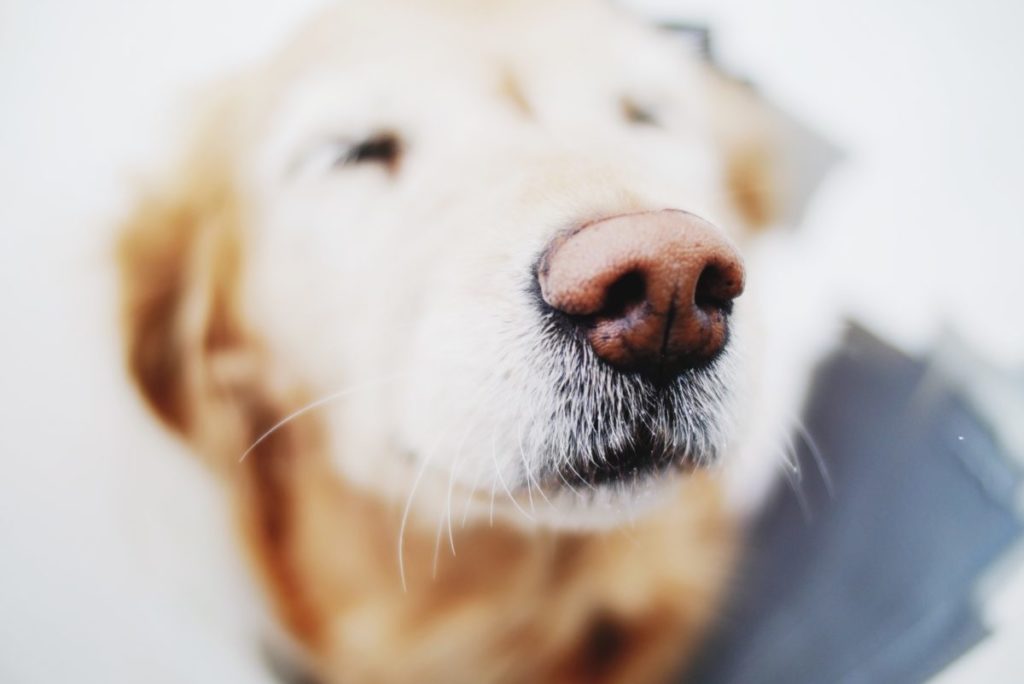If your dog is shaking his head a lot, it may be pointing to an underlying health issue. While head shaking in dogs can be a common behavior, it should not be happening frequently enough to cause concern. If you notice your dog is shaking its head more than normal, there may be an underlying reason for his behavior. Below is an introductory guide that will inform you of why dogs shake their heads, potential causes for excessive head shaking, and how to proceed to make sure your dog gets the attention and treatment he needs.
Breaking Down Why Dogs Shake Their Heads
 Before diving into what causes head shaking in dogs, it’s important to understand why your pet is demonstrating this behavior in the first place. Because dogs don’t have hands the way that humans do, they have adapted in order to address issues within their ears.
Before diving into what causes head shaking in dogs, it’s important to understand why your pet is demonstrating this behavior in the first place. Because dogs don’t have hands the way that humans do, they have adapted in order to address issues within their ears.
One of the most common methods dogs use is head shaking, which allows them to quickly rid their ears of anything that may have become lodged or stuck inside. As a dog owner, head shaking is perhaps most commonly associated with a dog getting out of water. When a dog shakes his head back and forth, they exert impressive force on their ears that help to remove any unwanted debris or water.
When a dog is experiencing irritation or itchiness inside of their ears, their natural response is to vigorously shake their head in order to alleviate the discomfort they are feeling. While this may be effective in some situations, such as if they have water or a bug trapped in their ear, it may not be adequate to help alleviate other potential causes of irritation and itchiness. If head shaking continues, it is an indication that the dog is experiencing continued discomfort and irritation that will need human intervention. A good rule of thumb to follow is if your dog has been shaking his head more frequently for a day or more, then a visit to a licensed veterinarian may be in order.
Potential Causes of Head Shaking in Dogs
If you’ve noticed that your dog is shaking his head more than normal, there are a number of different causes that could be to blame. By having foundational information about some of the most common sources of head shaking in dogs, you can observe your dog’s behavior and have a better idea of what might be triggering their behavior. Below are several common causes of head shaking in dogs.
Ear Infections (Bacterial and Yeast Infections)
One of the most common causes of excessive head shaking is canine ear infections. Dogs can contract both bacterial and yeast ear infections. Just as in human beings, ear infections in dogs can be painful and uncomfortable. They tend to cause the ear to become inflamed and itchy, and in some cases, can also have discharge. All of these factors make the dog want to shake his head to alleviate the discomfort he is feeling. But how do you know if your dog is suffering from a bacterial or yeast ear infection?
In some cases, it can be difficult to tell whether or not an ear infection is present depending on where the infection is occurring. Ear infections that are deep within the ear canal will be difficult to notice as an owner, but when the infection is more external, there will be noticeable symptoms. Symptoms to be on the watch for include redness, swelling, and/or discharge in the ear. All of these indicate that there is an infection present that needs to be treated.
In some dogs, these symptoms may also be present if there is an ear mite infestation, which will also require veterinary intervention and treatment. If you suspect that your dog may have an ear infection from yeast or bacteria, they need to see a licensed veterinarian immediately to get a physical examination. Your vet will be able to determine the correct course of treatment needed to address the problem.
Allergies
 If your dog is shaking his head excessively, another potential culprit is canine allergies. Many dogs suffer from allergies, whether it is to certain foods or elements in their environment. Just like humans, dogs can be allergic to any number of things that they encounter or ingest, such as grain, poultry, grass, ingredients in their shampoo, pollen, mold spores, dust, and much more. When a dog is suffering from allergies, they will exhibit symptoms that include head shaking, chewing at their feet, rubbing at their face, scratching at their ears, itchy dog skin, canine hair loss, and frequent ear and skin infections.
If your dog is shaking his head excessively, another potential culprit is canine allergies. Many dogs suffer from allergies, whether it is to certain foods or elements in their environment. Just like humans, dogs can be allergic to any number of things that they encounter or ingest, such as grain, poultry, grass, ingredients in their shampoo, pollen, mold spores, dust, and much more. When a dog is suffering from allergies, they will exhibit symptoms that include head shaking, chewing at their feet, rubbing at their face, scratching at their ears, itchy dog skin, canine hair loss, and frequent ear and skin infections.
Just as determining a food or environmental allergy can be difficult in human beings, it is a similar challenge for dogs. For food allergies in dogs, some veterinarians will recommend placing the pet on an extremely restricted diet that has only a few ingredients to see if the symptoms abate. If they do, then a food allergy is likely the culprit. If an environmental allergy is suspected, some veterinarians will utilize blood testing or intradermal skin testing to determine what the potential allergen(s) may be so that it can be removed from the dog’s environment.
This process may take time and trial and error to be effective, but once the allergen(s) is isolated, the symptoms should disappear entirely over time. In some cases, a veterinarian may recommend allergy medication depending on what the underlying allergen is. To identify the correct allergen, it is essential to work with a licensed veterinarian so that your dog can feel more comfortable as soon as possible.
Water Trapped in the Ears
While many pups love to get wet during a bath or swim, sometimes it can result in water becoming trapped in their ears, just as it can with humans. If a dog has water trapped in his ears, he will often shake his head vigorously in an attempt to dispel the trapped water. This can sometimes be prevented by being extra careful during bathtime, but in some cases, the only way to avoid this risk is by preventing your dog from swimming. However, there is usually a simple solution if this is the underlying cause for persistent head shaking. Consult with a veterinarian to determine the right product to use in your dog’s infected ears to dry out the water that may be trapped. Once the water has evaporated, your dog’s discomfort should subside.
Foreign Object Trapped in the Ear
Another potential culprit for excessive head shaking may be from a foreign object that has been trapped in the dog’s ear. A common foreign object that can easily become lodged in a dog’s ear is a foxtail. These pesky weeds can be extremely uncomfortable and painful if one makes its way into a dog’s ear. If you think your dog may be suffering from this issue, shine a flashlight inside to get a better look. If the object is still visible, you may be able to carefully remove it, but if it has traveled deep into the ear, it will likely require veterinary intervention. In some cases, the dog may need to be sedated to remove the foreign object, depending on where it is located.
Fleas
Fleas can be an uncomfortable and persistent pest for dogs. As they infest a dog’s fur and crawl all over them, canines can become increasingly uncomfortable and irritated by their presence. If the fleas are on the dog’s ears, this can sometimes lead to persistent head shaking. To check if your dog has fleas, gently pull apart the fur on various areas of his body. If they have fleas, you will likely come across several crawling on his skin. Thankfully, there are a variety of different solutions that can be utilized to combat fleas on dogs. A trip to the veterinarian will confirm the presence of fleas and may result in prescription medication that will end the infestation and prevent it from occurring again. In addition to prescription medications, frequent baths and medicated collars can also be useful tools to fight against fleas.
Ear Vasculitis
A potential cause for head shaking that you may not have heard of is ear vasculitis, which is more common in some dog breeds, such as Jack Russell Terriers and Dachshunds. Ear vasculitis is when the vessels of the ear flap or pinna become inflamed. In some cases, the external portions of the ears may also crust over or become ulcerated. The dog will try to shake his head in hopes of relieving his pain and inflammation. If your dog is displaying these symptoms, visit a licensed veterinarian immediately for further examination.
Ear Hematomas
This potential cause actually stems from the dog’s persistent head shaking, which can cause further trauma to the dog’s ears over time. Dog’s ears are tender and are comprised of delicate cartilage, which can be damaged when it is forcefully shaken and slapped against the dog’s skull repeatedly. If the head shaking persists, the blood vessels within the pinna can be damaged, which causes them to break open and bleed.
As the blood vessels bleed, they can form a pocket of blood, which is called a hematoma. A hematoma will appear as a bump under the surface of the skin on the dog’s ear and will likely increase the dog’s desire to shake his head. If your dog is developing ear hematomas from head shaking, visit a veterinarian immediately so that they can be examined and begin treatment. Some veterinarians may recommend putting your dog in a collar that doesn’t allow him to shake his head or itch his ears until he has completely healed.
What to Do if Your Dog is Shaking His Head
 If your dog is shaking his head more than normal and you are unsure why, it is important to make an appointment with a veterinarian so that they can do a comprehensive assessment. During the appointment, they will often ask when the shaking began, how long it has been happening, if it has worsened, and inquire about any other symptoms or medical history that may be relevant to determine a diagnosis.
If your dog is shaking his head more than normal and you are unsure why, it is important to make an appointment with a veterinarian so that they can do a comprehensive assessment. During the appointment, they will often ask when the shaking began, how long it has been happening, if it has worsened, and inquire about any other symptoms or medical history that may be relevant to determine a diagnosis.
A veterinarian will also do a full physical examination and recommend any tests or blood work that are necessary to determine the underlying cause of the head shaking. If your dog is shaking his head, there is likely a reason that they are displaying this behavior. Visiting a veterinarian will allow you to get your dog the help and treatment he needs so that he can get back to feeling comfortable as soon as possible.
Sources:
“Head Shaking in Dogs: When to Worry.” PetMD, 12 June 2017, www.petmd.com/dog/conditions/ears/head-shaking-dogs-when-worry.
“Why Is My Dog Shaking His Head?” Newport Harbor Animal Hospital, 27 May 2017, www.newportharborvets.com/services/dogs/blog/why-is-my-dog-shaking-his-head.
Fuller, Mary. “Why Is My Dog Shaking His Head All the Time?” Vetstreet, www.vetstreet.com/our-pet-experts/why-does-my-dog-shake-his-head-all-of-the-time.




